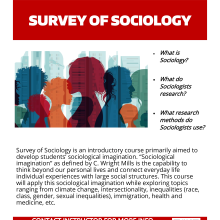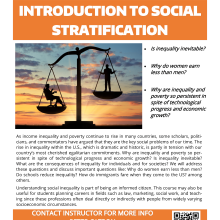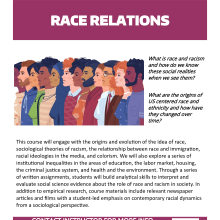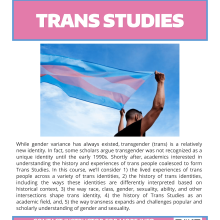AUTUMN 2024
SOC 110, Rosalind Kichler, 5 CREDITS, (SSc) M/W 10:30 AM-12:20 PM, SLN: 21515
Survey of Sociology is an introductory course primarily aimed to develop students’ sociological imagination. “Sociological imagination” as defined by C. Wright Mills is the capability to think beyond our personal lives and connect everyday life individual experiences with large social structures. This course will apply this sociological imagination while exploring topics ranging from climate change, intersectionality, inequalities (race, class, gender, sexual inequalities), immigration, health and medicine, etc. For more information, contact the course instructor, Rosalind Kichler at rkichler@uw.edu
SOC 360 INTRO TO SOCIAL STRATIFICATION, Peter Catron, 5 CREDITS (DIV, SSc), M/W 1:30 PM-3:20 PM, SLN: 21553
As income inequality and poverty continue to rise in many countries, some scholars, politicians, and commentators have argued that they are the key social problems of our time. The rise in inequality in the U.S., which is dramatic and historic, is partly in tension with our country's most cherished egalitarian commitments. Why are inequality and poverty so persistent in spite of technological progress and economic growth? Is inequality inevitable? What are the consequences of inequality for individuals and for societies? We will address these questions and discuss important questions like: Why do women earn less than men? Do schools reduce inequality? How do immigrants fare when they come to the U.S.? among others.
Understanding social inequality is part of being an informed citizen. This course may also be useful for students planning careers in law, marketing, social work, and teaching since these professions often deal directly or indirectly with people from widely varying socioeconomic circumstances. For more information, contact instructor Peter Catron at catron@uw.edu
SOC 362 RACE RELATIONS, Theresa Rocha Beardall, 5 CREDITS, (DIV, SSc) T/TH 2:30 PM-4:20 PM, SLN: 21556
“Race matters” in the United States tell a complex story. On one hand, racial discrimination is outlawed, most Americans believe that diversity strengthens the country, and today’s youth are arguably the most open-minded generation to date. Yet, America is more racially segregated today than at the end of the Civil War; the Supreme Court recently ended race-conscious admission programs at U.S. colleges and universities, effectively ending affirmative action; and, in comparison to whites, most racial minorities are far more likely to receive an inferior education, lower pay, and heavier prison sentences for the same crimes. In this seminar, rather than asking if race matters for life outcomes, we will ask how and why it does and, importantly, what the contributions from scholars and artists teach us about the durability of “the problem we all live with.” For more information, contact the course instructor Theresa Rocha Beardall at tyrb@uw.edu
SOC 401 B TRANS STUDIES, Rosalind Kichler, 5 CREDITS, (SSc) M/W 2:30 PM-4:20 PM, SLN: 21566
While gender variance has always existed, transgender (trans) is a relatively new identity. In fact, some scholars argue transgender was not recognized as a unique identity until the early 1990s. Shortly after, academics interested in understanding the history and experiences of trans people coalesced to form Trans Studies. In this course, we’ll consider 1) the lived experiences of trans people across a variety of trans identities, 2) the history of trans identities, including the ways these identities are differently interpreted based on historical context, 3) the way race, class, gender, sexuality, ability, and other intersections shape trans identity, 4) the history of Trans Studies as an academic field, and, 5) the way transness expands and challenges popular and scholarly understanding of gender and sexuality. For more information, contact the course instructor Rosalind Kichler at rkichler@uw.edu



